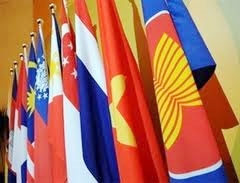ASEAN discusses setting up common market
 |
Regional officials met ahead of the Association of Southeast Asian Nations Summit yesterday. They agreed to further accelerate the implementation of regional agreements and commitments. They also agreed on the need to strengthen regional co-ordination.
The ASEAN Economic Community (AEC), one of the three pillars of the future ASEAN Community, is on the verge of fully implementing targets set down in 2008-09, and has moved on to the second phase covering the period 2010-11.
To form an ASEAN single market and common production base, the region was striving to achieve more equitable economic development and greater integration into the global economy. Members must continue their efforts to go through two more phases scheduled for 2012-13 and 2014-15, the conference heard.
Since the 16th ASEAN Summit in Hanoi last April, great progress has been made towards achieving a regional community by 2015 with a single market and a common production base, delegates heard. The ASEAN Trade in Goods Agreement, a comprehensive legal instrument designed to encourage the free flow of goods, came into force last May.
However, almost 20 per cent of the targets under the AEC Blueprint for 2008-09 have still to be achieved. This has been blamed on delays in the ratification of signed agreements and the alignment of ASEAN-wide agreements with member states' laws, particularly in the areas of goods, services, investment and transport.
For the 2010-11 period, there are also delays in sectors such as goods, services and transport, as well finance and the implementation of commitments under the Plus One FTAs.
Regarding competitiveness, the "ASEAN Regional Guidelines on Competition Policy" and the "Handbook on Competition Policy and Law in ASEAN for Business" were finalised by the ASEAN Experts Group on Competition and agreed by ASEAN economic ministers in August in Danang.
These two documents are expected to facilitate the introduction and maintenance of a level playing field in the region, while improving the local business environment for domestic and trans-national enterprises operating in ASEAN.
The meeting also heard that there had been major achievements in sectors of energy, transport, information communications technology and tourism.
Regarding equitable economic development, the Strategic Plan of Action for ASEAN Small and Medium Enterprises Development 2010-15 was developed to replace the ASEAN Policy Blueprint for SME Development 2004-14.
An SME Advisory Board, consisting of the heads of ASEAN SME agencies and representatives from the private sector, will be established to provide a forum for networking. It will also deliberate SME-related regional flagship projects and policy matters.
Eighth package
ASEAN economic ministers yesterday signed a protocol to implement the eighth package of commitments under the ASEAN Framework Agreement on Services.
They also signed an amendment to the protocol to provide special consideration for rice and sugar within ASEAN.
The eighth package puts forward a roadmap for the liberalisation of 15 new sectors with the participation of up to 70 per cent of foreign capital for priority sectors in ASEAN, namely healthcare, tourism, e-ASEAN and aviation transport - and 51 per cent for other services.
The signing of the protocol on the eighth package of commitments is said to reflect important progress in liberalising services within the region to help in the establishment of the ASEAN Economic Community in 2015.
This is said to also confirm ASEAN's determination to liberalise intra-bloc services by eradicating most service barriers.
The commitment is higher than that within the framework of the World Trade Organization.
What the stars mean:
★ Poor ★ ★ Promising ★★★ Good ★★★★ Very good ★★★★★ Exceptional
Related Contents
Latest News
More News
- Foreign fruits flood Vietnamese market (December 09, 2025 | 13:22)
- Vietnam’s fruit and vegetable exports reach $7.8 billion in first 11 months (December 05, 2025 | 13:50)
- Vietnam shapes next-generation carbon market (November 26, 2025 | 15:33)
- PM urges Ho Chi Minh City to innovate and remain Vietnam’s economic locomotive (November 26, 2025 | 15:29)
- Experts chart Vietnam's digital finance path: high hopes, high stakes (November 14, 2025 | 10:56)
- Vietnam’s seafood imports surge 30 per cent in first 10 months (November 10, 2025 | 19:35)
- Vietnam’s durian exports hit $1 billion milestone (October 30, 2025 | 17:41)
- Beyond borders: Sunhouse and new era of Vietnamese brands on Amazon (October 28, 2025 | 10:46)
- Record-breaking trade fair set to open in Hanoi (October 15, 2025 | 15:59)
- Timber sector seeks solutions to VAT refunds (October 14, 2025 | 18:58)

 Tag:
Tag:




















 Mobile Version
Mobile Version